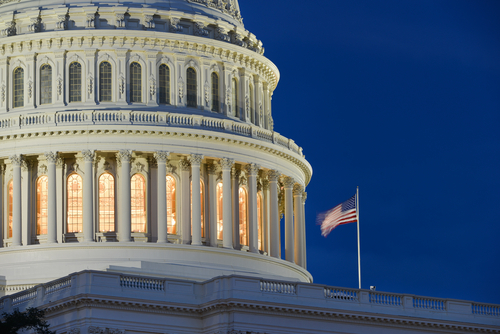
On the day before House Transportation and Infrastructure considered highway legislation drafted by Democrats on the Committee, stakeholders in infrastructure projects spoke out to say any highway legislation should be bipartisan.
Representatives from the Senate, American Road & Transportation Builders Association (ARTBA), American Association of State Highway and Transportation Officials (AASHTO) and other organizations pointed to last year’s America’s Transportation Infrastructure Act (ATIA), as a model for how effective legislation should be done. The ATIA was introduced by Sens. John Barrasso (R-WY), Tom Carper (D-DE), Shelley Moore (R-WV), and Ben Cardin (D-MD). The bill authorized $287 billion over five years, including $259 billion for programs to maintain and repair the country’s aging roads and bridges.
Barroso, the chair of the Senate Environment and Public Works Committee, said it’s important for Republicans and Democrats to work together.
“In the Senate, Republicans and Democrats worked together to write a bipartisan highway infrastructure bill that would help the whole country. Instead of following the Senate’s lead, House Democrats cut Republicans out of the process and wrote a partisan bill. The House Democrats’ bill limits the flexibility states have to get priority projects done – while creating new paperwork burdens,” Barroso said. “It also radically increases funding for transit, at a time when fewer Americans will use these systems because of COVID. Leaders in the House should look to America’s Transportation Infrastructure Act as a bipartisan model. Infrastructure legislation is critical to our economic recovery, and it must help the entire country, not just select urban centers.”
The ATIA was passed through the EPW Committee unanimously on July 30, 2019. Carper is the ranking member of that committee. Moore is the chair of the Transportation and Infrastructure Subcommittee. Cardin is that committee’s ranking member.
Dave Bauer with ARTBA said support on both sides of the aisle, and in the public, for infrastructure investments is particularly high right now.
“Former U.S. Transportation Secretary Norm Mineta often said ‘there are no Democratic or Republican highways.’ Last summer’s unanimous approval by the Senate Environment & Public Works Committee of the largest highway program reauthorization in decades reminds us that sentiment is alive and well on Capitol Hill today,” Bauer said. “Consensus-building has been at the core of federal transportation policy since the creation of the Interstate Highway System and is certainly a requirement today. The clock is ticking and ARTBA will continue to work with both parties to deliver the highway/transit bill the American people deserve and the U.S. economy needs.”
The current highway spending infrastructure bill, the FAST Act, expires on Sept. 30, 2020.
Jim Tymon, executive director of AASHTO, called the partisan legislation “disappointing.”
“It is disappointing that this legislation was not developed in a bipartisan manner. Transportation has traditionally been a bipartisan issue and both sides of the aisle will have to work together to get a surface transportation bill over the finish line,” he said. “We remain encouraged that infrastructure appears to be a priority in both the House and the Senate and we look forward to working with Congressional leaders to enact legislation before the expiration of the FAST Act that will fully fund the highway trust fund and ensure the nation’s transportation system remains the backbone to economic vitality and overall quality of life.”